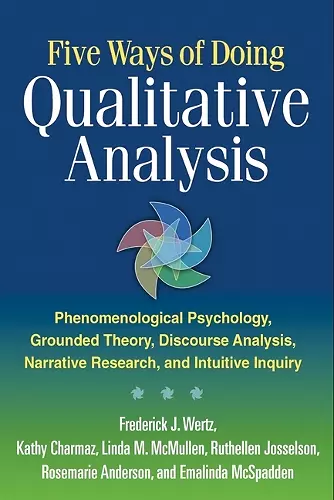Five Ways of Doing Qualitative Analysis
Phenomenological Psychology, Grounded Theory, Discourse Analysis, Narrative Research, and Intuitive Inquiry
Linda M McMullen author Kathy Charmaz author Rosemarie Anderson author Frederick J Wertz author Emalinda McSpadden author
Format:Paperback
Publisher:Guilford Publications
Published:13th May '11
Should be back in stock very soon
This paperback is available in another edition too:
- Hardback£81.99(9781609181437)

This unique text provides a broad introduction to qualitative analysis together with concrete demonstrations and comparisons of five major approaches. Leading scholars apply their respective analytic lenses to a narrative account and interview featuring "Teresa," a young opera singer who experienced a career-changing illness. The resulting analyses vividly exemplify what each approach looks like in action. The researchers then probe the similarities and differences among their approaches; their distinctive purposes and strengths; the role, style, and subjectivity of the individual researcher; and the scientific and ethical complexities of conducting qualitative research. Also included are the research participant's responses to each analysis of her experience. A narrative account from another research participant, "Gail," can be used by readers to practice the kinds of analysis explored in the book.
"An extraordinary achievement. This is the book I will recommend to my quantitative colleagues when they ask, 'Just what is qualitative research?' Unlike other books that give steps for doing a qualitative study, Five Ways takes the reader into the thoughts and feelings involved in conducting research. The exciting, informative interactive discussions among the researchers and the participant provide unique insights. I will use Five Ways as the basic text in my qualitative courses."--Donald E. Polkinghorne, PhD, Professor Emeritus, Department of Counseling Psychology, University of Southern California
"Not only do the authors look at a common data set in five different ways, but they also reflect on how all five analyses look to each of them, and these explorations are 'looked back at' by the participant from whom the data set was derived. This book provides an engaging and intimate view of the many selves it takes to bring qualitative analyses into being and the reflexive practices that contribute to the scientific and ethical integrity of research."--Margarete Sandelowski, PhD, RN, FAAN, School of Nursing, University of North Carolina at Chapel Hill
"This unique work is a wholly absorbing adventure in comparative methodology. For the student, it will serve as an effective and informative introduction to a range of central qualitative methodologies. For the seasoned scholar, it provides a wonderfully nuanced view of the complex processes of decision making in qualitative inquiry. The book challenges us to grapple with major issues: the goals of our work, its functions in the social world, and its ethical implications. This is a landmark work in the development of qualitative inquiry."--Kenneth J. Gergen, PhD, Department of Psychology, Swarthmore College
"The logic of the book is transparent: it presents a narrative, multiple interpretations, and a comparison of the varied interpretations. The experience of walking through the various interpretations and then seeing how experts unpack the differences and similarities among them is remarkable. Although many books are written for introductory courses on qualitative methods, very few authors attend to how the structure of a text--not just its content--might be pedagogically significant. I applaud Wertz et al. for thinking explicitly and intentionally about how to conceptualize and organize their text in a way that facilitates learning."--Suzanne M. Wilson, PhD, Department of Teacher Education and Director, Center for the Scholarship of Teaching, Michigan State University
"This text addresses one of the most frequently asked questions in qualitative analysis: what is the difference between phenomenology, grounded theory, discourse analysis, narrative research, and intuitive inquiry? The authors explain the theory that underlies each approach and illustrate its application and the resultant findings, making the book a worthy text for a qualitative methods course. As an added bonus, the authors present the participant's reaction to the results of the five different analyses and discuss the ethical implications in terms of letting the participant speak for herself, issues of confidentiality, and tensions around interpretation of data. I would definitely use this book in my advanced qualitative research course."--Donna M. Mertens, PhD, Department of Educational Foundations and Research, Gallaudet University
"A powerful, richly nuanced, brilliantly innovative pedagogical intervention into the field of qualitative inquiry. This book is clearly written, grounded in case materials, and very accessible to students. The narrative is driven by the voices and insights of preeminent scholars, each an expert in one of five ways of doing qualitative analysis. This book represents the most innovative approach to date for teaching qualitative analysis. It will provide a starting place for the next generation of students who want to learn how to be well-grounded qualitative inquirers."--Norman K. Denzin, PhD, College of Communications Scholar, University of Illinois at Urbana-Champaign
-
ISBN: 9781609181420
Dimensions: unknown
Weight: 480g
434 pages